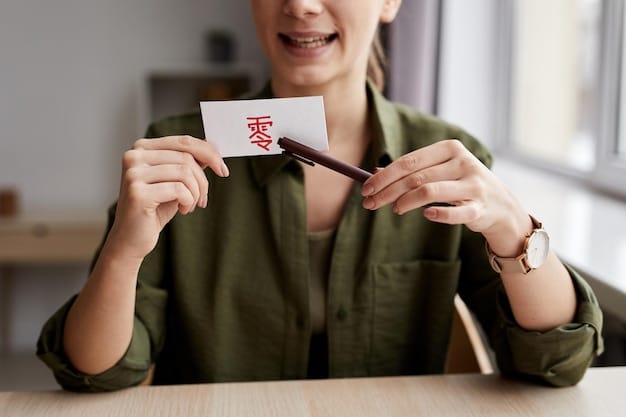Understanding Key Japanese Concepts: A Cultural Guide

Understanding Japanese Concepts offers a window into the unique cultural values, principles, and philosophies that shape Japanese society, influencing everything from etiquette and interpersonal relationships to art and business practices.
Exploring the intricate web of Japanese culture, one encounters a range of concepts that may seem foreign at first glance. Understanding Japanese concepts is essential for anyone seeking to truly appreciate and navigate this fascinating society.
Harmony and Balance: Wa (和) in Japanese Culture
Wa (和), meaning harmony, is a cornerstone of Japanese society, emphasizing the importance of maintaining peaceful relationships and avoiding conflict. This concept permeates various aspects of life, from social interactions to business negotiations.
Understanding Wa provides crucial insights into Japanese communication styles and expectations.
The Significance of Group Harmony
In Japan, group harmony often takes precedence over individual expression. Maintaining a sense of unity and cooperation is considered essential for the smooth functioning of society.
Avoiding Direct Confrontation
Direct confrontation is generally avoided in Japanese culture to preserve Wa. Instead, indirect communication and subtle cues are often used to convey disagreement or concerns.
- Consensus-building is favored over assertive decision-making.
- Saving face (meiyo) is crucial in maintaining harmony within relationships.
- Consideration for others’ feelings is paramount in social interactions.
Wa extends beyond interpersonal relationships to encompass a broader sense of balance and interconnectedness with nature and the universe. Appreciating Wa helps foster deeper understanding of Japanese values.
Respect and Courtesy: Omoiyari (思いやり) in Social Interactions
Omoiyari (思いやり) represents the act of anticipating and understanding the needs of others, demonstrating empathy, and acting accordingly. It is a fundamental element of Japanese etiquette and social harmony.
Mastering Omoiyari can elevate interactions, ensuring respect and fostering genuine connection.

The Art of Empathetic Consideration
Omoiyari involves proactively considering how one’s actions may affect others, striving to create a comfortable and harmonious environment for everyone involved.
Anticipating Unspoken Needs
It goes beyond simply being polite; it requires anticipating needs before they are explicitly expressed, demonstrating a deep level of care and attention.
- Paying attention to nonverbal cues and subtle hints.
- Offering assistance without being asked, when appropriate.
- Demonstrating thoughtfulness through small gestures and acts of kindness.
Embracing Omoiyari strengthens social bonds, fostering trust and mutual respect. By practicing Omoiyari, individuals contribute to a more considerate and harmonious society.
The Impermanence of Things: Wabi-sabi (侘寂) in Aesthetics
Wabi-sabi (侘寂) is a Japanese aesthetic philosophy that embraces imperfection, transience, and simplicity. It celebrates the beauty found in the natural aging process and the unique character of handcrafted objects.
Understanding Wabi-sabi creates reverence for authenticity and simplicity, enhancing appreciation for the world’s nuanced beauty.
Finding Beauty in Imperfection
Wabi-sabi challenges conventional notions of beauty, suggesting that true beauty lies in the imperfect, asymmetrical, and incomplete.
Accepting the Transient Nature of Life
It encourages acceptance of the transient nature of life, embracing the ebb and flow of time and the inevitable changes that come with it.
- Appreciating the patina of age and the marks of use on objects.
- Finding beauty in asymmetry and irregularity.
- Embracing simplicity and naturalness in design and lifestyle.
Wabi-sabi inspires mindful living, encouraging individuals to find contentment in the present moment and appreciate the simple pleasures of life. Recognizing Wabi-sabi promotes a sense of peace and acceptance.
Continuous Improvement: Kaizen (改善) in Business
Kaizen (改善), meaning “improvement,” is a Japanese business philosophy that emphasizes continuous incremental improvements. It involves all employees in the process of identifying and implementing small changes that lead to greater efficiency and quality.
Adopting Kaizen fosters efficiency and productivity, ultimately improving organizational success.
The Power of Incremental Change
Kaizen recognizes that small, consistent improvements can have a significant cumulative impact over time. It focuses on making gradual changes that are sustainable and manageable.
Employee Empowerment and Participation
It relies on the active participation of all employees, empowering them to identify problems and suggest solutions. This fosters a sense of ownership and accountability.

- Encouraging employees to offer suggestions and feedback.
- Creating a culture of experimentation and learning.
- Implementing changes quickly and efficiently.
Kaizen promotes a culture of continuous learning and innovation, driving organizational growth and competitiveness. Implementing Kaizen leads to better results and employee satisfaction.
The Concept of Face: Meiyo (名誉) in Japanese Society
Meiyo (名誉), often translated as “honor” or “face,” plays a crucial role in Japanese society, influencing social interactions, business dealings, and personal conduct. It encompasses an individual’s reputation, dignity, and standing within the community.
Understanding Meiyo provides a nuanced understanding of respect and social expectations.
Maintaining Personal and Professional Reputation
Protecting one’s Meiyo is of paramount importance, as it reflects on their family, company, and social group. Actions that could cause embarrassment or disgrace are carefully avoided.
The Importance of Reputation Management
Maintaining Meiyo requires upholding ethical standards, fulfilling obligations, and demonstrating competence in one’s role. A loss of Meiyo can have serious consequences.
- Avoiding behavior that could bring shame or dishonor.
- Fulfilling commitments and obligations promptly.
- Maintaining a respectful and courteous demeanor.
Meiyo shapes behavior and reinforces social norms, contributing to a culture of responsibility and accountability. Recognizing Meiyo encourages respectful interactions and long-term thinking.
Mindfulness and Focus: Zanshin (残心) in Martial Arts and Daily Life
Zanshin (残心) is a concept originating in Japanese martial arts, referring to a state of sustained awareness and readiness, even after an action has been completed. It emphasizes maintaining focus and alertness at all times.
Practicing Zanshin increases concentration and resilience, benefiting one’s personal and professional life.
Sustained Awareness and Readiness
Zanshin involves maintaining mental and physical preparedness, anticipating potential threats or opportunities, and remaining vigilant even when relaxed.
Extending Focus Beyond the Immediate Action
It goes beyond simply completing a task; it requires maintaining awareness of the surrounding environment and anticipating the next course of action.
- Staying alert and attentive to details.
- Maintaining a sense of balance and composure.
- Anticipating potential challenges or obstacles.
Zanshin cultivates mindfulness and presence, enhancing performance and reducing the risk of errors. Understanding Zanshin fosters calm and observant lifestyles.
| Key Concept | Brief Description |
|---|---|
| 🤝 Wa (Harmony) | Emphasizes maintaining peaceful relationships and avoiding conflict. |
| 🌱 Omoiyari (Empathy) | Anticipating and understanding the needs of others with empathy. |
| 🌸 Wabi-sabi (Aesthetics) | Embracing imperfection, transience, and simplicity in aesthetics. |
| 🚀 Kaizen (Improvement) | Continuous incremental improvements in business and life. |
Frequently Asked Questions
Understanding Japanese Concepts
Understanding Japanese Concepts
Understanding Japanese Concepts
Understanding Japanese Concepts





